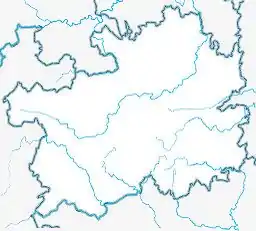Yuxi, Daozhen County
Yuxi (simplified Chinese: 玉溪镇; traditional Chinese: 玉溪鎮; pinyin: Yùxī Zhèn) is a town in Daozhen Gelao and Miao Autonomous County, Guizhou, China.[1] As of the 2016 census it had a population of 76,379 and an area of 245.89-square-kilometre (94.94 sq mi).
Yuxi Town
玉溪镇 | |
|---|---|
 Yuxi Town Location in Guizhou | |
| Coordinates: 28°51′57″N 107°36′20″E | |
| Country | China |
| Province | Guizhou |
| Prefecture | Zunyi |
| Autonomous county | Daozhen Gelao and Miao Autonomous County |
| Area | |
| • Total | 245.89 km2 (94.94 sq mi) |
| Population (2016) | |
| • Total | 76,379 |
| • Density | 310/km2 (800/sq mi) |
| Time zone | UTC+08:00 (China Standard) |
| Postal code | 563502 |
| Area code | 0851 |
Administrative division
As of 2016, the town is divided into eight villages:
- Chengguan (城关村)
- Bayu (巴渔村)
- Chi (池村)
- Songjiang (淞江村)
- Dalu (大路村)
- Panxi (蟠溪村)
- Wuba (五八村)
- Tuchengba (土城坝村)
Geography
The highest point in the town stands 1,625.2 metres (5,332 ft) above sea level. The lowest point is at 376 metres (1,234 ft) above sea level.
Furong River (芙蓉江), Mei River (梅江), Bayu Stream (巴渔溪), Yu Stream (玉溪), Pan Stream (蟠溪), Shuicun Stream (水村河) flow through the town.
Climate
Yuxi is in the subtropical humid monsoon climate zone, with an average annual temperature of 15.6 °C (60.1 °F), total annual rainfall of 1,070-millimetre (42 in), a frost-free period of 250 days and annual average sunshine hours about 1000 to 1100 hours. The highest temperature is 26.1 °C (79.0 °F), and the lowest temperature is 4.6 °C (40.3 °F).
Economy
The economy is supported primarily by farming, ranching and mineral resources. Mineral resources include phosphate iron, hematite, coal line, glass, granite, calcite, silica, manganese, etc.
Tourist attractions
The main attractions are the Yundingshan Scenic Spot (云顶山风景区), Shaba Reservoir (沙坝水库), Songjiang Rafting (淞江漂流), and Songjiang Hot Spring (淞江温泉).
Panxi Temple (蟠溪寺) is a Buddhist temple located in the town, which was originally built in the Yuan dynasty (1271–1368).
Wantian Palace (万天宫) is a Taoist temple built in the Daoguang period (1821–1850) of the Qing dynasty (1644–1911), which has been designated as a provincial key cultural unit.
References
- Liu Jiangnian 2007, p. 260.
Bibliography
- Liu Jiangnian, ed. (2007). "Rural construction" 乡村建设. 《道真仡佬族苗族自治县概况》 [General Situation of Daozhen Gelao and Miao Autonomous County] (in Chinese). Beijing: Nationalities Publishing House. ISBN 978-7-105-08537-8.